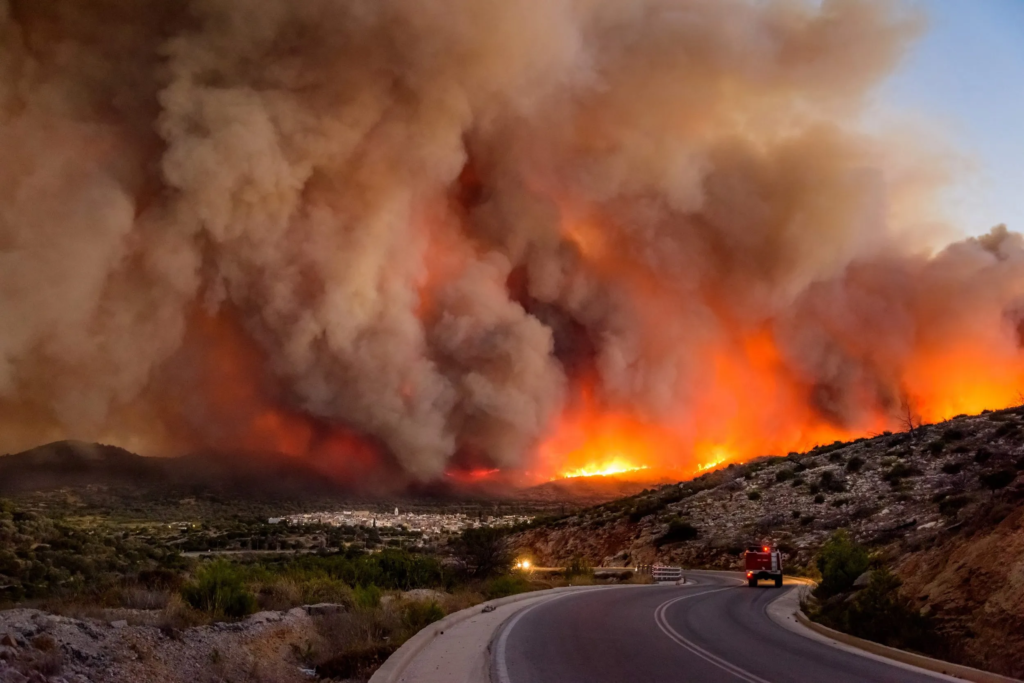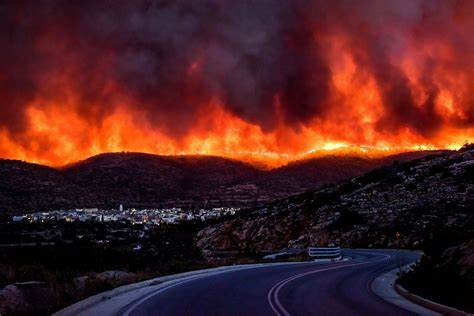The summer of 2023 will be etched in Greece’s history as a period of unprecedented devastation. A relentless onslaught of wildfires swept across the country, leaving behind a trail of charred landscapes, displaced communities, and a nation grappling with the harsh realities of climate change. From the popular tourist island of Rhodes to the mainland’s verdant forests, the flames spared no corner of Greece.
This article delves deep into the heart of this crisis, examining its causes, impact, and the ongoing efforts to contain the fires and rebuild affected areas.

The Inferno: A Closer Look
Unprecedented Scale and Intensity
The 2023 Greek wildfires were characterized by their sheer scale and intensity. Hundreds of fires erupted simultaneously, fueled by a combination of factors including record-breaking temperatures, prolonged drought, and strong winds. The rapid spread of these fires overwhelmed firefighting resources, making containment a daunting challenge.
The Human Toll
The human cost of the wildfires was immense. Tragically, dozens of lives were lost, with many more injured. Thousands of residents and tourists were forced to evacuate their homes and hotels, leaving behind their belongings and facing uncertainty. The psychological impact of such a disaster is profound, and support services have been mobilized to help those affected cope with the trauma.
Causes of the Fires: A Complex Equation
Climate Change: The Underlying Threat
Scientists and experts overwhelmingly agree that climate change is a primary driver of the increased frequency and severity of wildfires globally. Rising temperatures, altered precipitation patterns, and more frequent heatwaves create ideal conditions for the ignition and spread of fires.
Human Factors: Arson and Negligence
While climate change is a significant factor, human activities also play a role in exacerbating the wildfire crisis. Arson, accidental fires caused by negligence, and the expansion of urban areas into fire-prone zones contribute to the problem.
The Role of Land Management Practices
Traditional land management practices, such as grazing and controlled burning, have historically helped to reduce the risk of large-scale wildfires. However, the decline of these practices in recent decades has left forests more vulnerable to fire.
The Battle Against the Flames
Firefighting Efforts: A Herculean Task
Greek firefighters, supported by international teams, have been working tirelessly to contain the blazes. Aerial support, including water-dropping planes and helicopters, has been crucial in accessing remote areas and slowing the fire’s progress. However, the extreme conditions have made firefighting a perilous task.
Evacuations and Emergency Response
Authorities have implemented comprehensive evacuation plans to protect lives. Emergency services, including the police, coast guard, and civil protection agencies, have been working around the clock to coordinate rescue efforts and provide essential assistance to those affected.
International Aid and Support
The international community has rallied behind Greece, offering assistance in the form of firefighting equipment, personnel, and financial aid. Countries from across Europe and beyond have sent specialized teams to support the Greek firefighting efforts.
The Aftermath: Recovery and Resilience
The Economic Impact
The wildfires have inflicted significant economic damage on Greece, affecting tourism, agriculture, and infrastructure. Rebuilding destroyed homes, businesses, and infrastructure will be a long and costly process.
Ecological Consequences
The loss of forests and wildlife habitat has had a devastating impact on Greece’s biodiversity. The recovery of ecosystems will take years, and efforts to reforest burned areas are already underway.
Building Resilience: Lessons Learned
The 2023 wildfires serve as a stark reminder of the urgent need to address climate change and improve disaster preparedness. Investing in early warning systems, fire prevention measures, and community resilience is essential for mitigating the impacts of future wildfires.
The 2023 Greece wildfires stand as a stark testament to the devastating consequences of climate change. The fires have caused immense suffering and loss, but they have also ignited a global conversation about the urgent need to address this crisis. As the world watches Greece rebuild, it is clear that collective action is essential to prevent similar tragedies in the future.

FAQ’S
What is causing the Greece fires?
A combination of factors contributes to the wildfires in Greece:
- Climate Change: Rising temperatures and prolonged droughts create ideal conditions for fires to start and spread.
- Human Activities: Accidental and deliberate fires, along with improper waste disposal, are significant contributors.
- Geography: Greece’s mountainous terrain and dry, windy conditions make it susceptible to wildfires.
When do the Greece fires usually occur?
Wildfire season in Greece typically runs from late June to early September, coinciding with the hottest and driest months. However, fires can occur outside this period as well.
Which areas in Greece are most affected by fires?
While wildfires can occur anywhere in Greece, some regions are more prone to them due to their geography and vegetation. Popular tourist destinations like Rhodes, Corfu, and Evia have experienced significant fires in recent years.
Are the Greece fires dangerous for tourists?
The safety of tourists is a top priority during wildfire season. While the risk varies depending on the location and severity of the fires, authorities issue warnings and evacuation orders when necessary. It’s essential to stay informed and follow the advice of local officials.
How can I stay safe during a Greece wildfire?
If you’re in Greece during wildfire season, follow these safety tips:
- Stay informed: Monitor news and weather updates for fire alerts.
- Obey evacuation orders: If instructed to evacuate, do so immediately.
- Avoid fire-prone areas: Be cautious when hiking or exploring remote areas.
- Be prepared: Pack an emergency kit with essentials like water, food, medications, and important documents.
What is the government doing to prevent and fight fires?
The Greek government has implemented various measures to address the wildfire crisis, including:
- Increased firefighting resources: Investing in more firefighters, equipment, and aircraft.
- Early warning systems: Developing advanced systems to detect fires early.
- Public awareness campaigns: Educating the public about fire prevention.
- International cooperation: Collaborating with other countries for support and expertise.
How can I help the victims of the Greece fires?
There are several ways to support those affected by the wildfires:
- Donate to reputable organizations: Many charities provide aid to fire victims.
- Volunteer your time: Offer assistance with relief efforts if possible.
- Spread awareness: Share information about the fires and the need for support.
Will travel insurance cover wildfire-related losses?
Travel insurance policies vary, so it’s essential to check your coverage carefully. Some policies may cover expenses related to evacuations, cancellations, or property damage caused by wildfires.
How has climate change impacted the Greece fires?
Climate change has significantly contributed to the increasing frequency and intensity of wildfires in Greece. Rising temperatures, longer droughts, and more extreme weather events create ideal conditions for fires to start and spread rapidly.
To read more, Click here